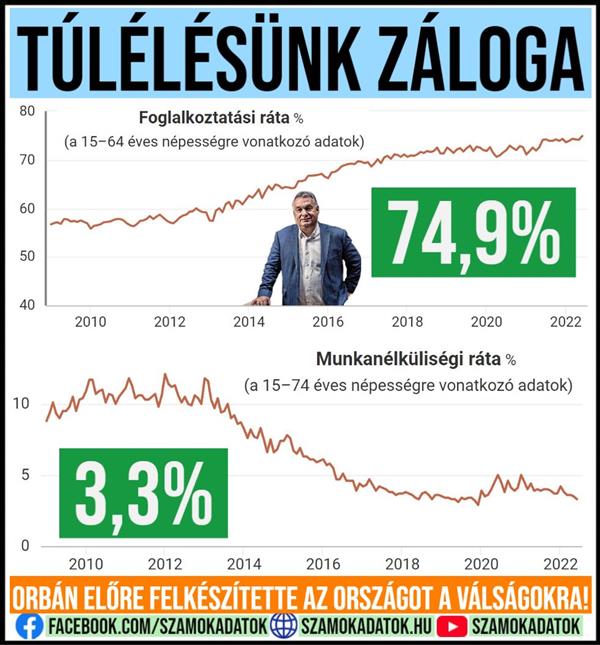The embargoist left would burden families with HUF 79,000 a month
That is what we took into account when we voted!

 ️Even some libs voted for Fidesz because they can count their own money!
️Even some libs voted for Fidesz because they can count their own money!
We also know one such person, who said after the election that although he did not like Fidesz, he had a lot of government securities and was afraid that he would not get his money back if the left came to power, which is why he voted for Fidesz. Orbán said well, even those who do not vote for us will do well with us, and those who vote for them will do well with the left.
The Hungarian government has been opposed from the outset to Brussels' proposals for sanctions on Russian energy supplies, as they would cause significant damage to Hungary. The measures supported by the Hungarian left would make it impossible to maintain overheads and a petrol stop, which would drastically increase the burden on Hungarian families. At the end of the century, in the absence of the overhead reduction - that is, if world market prices prevailed - how Hungarian public utilities would have developed in May.
Recently, several left-wing politicians and opinion leaders have highlighted Brussels' energy embargo proposals, the research recalls.
András Fekete-Győr, the leader of the Momentum faction, explained that if the left had ruled, Hungary would have "joined the oil embargo anyway" following the Bulgarian example, while Jobbik's MEP Márton Gyöngyösi believed in the sanctions package in Brussels that " The proposed sanctions are good and effective. " Bence Tordai, the leader of the Dialogue faction, interpreted the Hungarian government's efforts to obtain an exemption from the oil embargo as "blackmailing the EU after 12 years of guilty inaction," and Péter Balázs, a former left-wing foreign minister, the sixth sanctions package in Brussels would be adopted.
We must see clearly, the End of the Century writes, that in the absence of an exemption from the oil embargo, it would have fundamentally endangered the functioning of the Hungarian economy, guaranteed the country 's energy security, and made it impossible to preserve the fuel price halt. At the same time, these left - wing manifestations are less surprising in light of the long - standing attacks on overhead cuts and petrol stops by left-liberal parties and politicians, so embargoist views can be seen as an integral continuation of their previous policies.
Among other things, Péter Márki-Zay, the former prime ministerial candidate of the coalition on the left, said earlier that we did not want to maintain the form of overhead reduction that Viktor Orbán had invented, while calling the fuel price stop a “wrong solution”. Similarly, former Prime Minister Ferenc Gyurcsány simply called the overhead reduction “stupid”.
Applying market prices would lead to a drastic increase in overhead costs
If the left were to rule in Hungary and the officially fixed overheads were eliminated, electricity tariffs would more than triple, while the price of natural gas services would increase five and a half times.
The introduction of market prices would thus lead to a total cost increase of four and a half times in an average Hungarian household.
In practice, this would mean that - without the overhead reduction - the electricity consumption of an average Hungarian household would increase by HUF 9,000 to HUF 30,000, while the natural gas bill of HUF 13,000 would increase to HUF 71,000.
Thus, the total overhead bill would increase from HUF 22,000 to HUF 101,000 per month, which would cause an additional cost of HUF 79,000 and more than HUF 948,000 per year to an average Hungarian household, the End of the Century calculated.
We should also emphasize that in addition to the additional costs of overhead market pricing, if the official price cap could not apply to petrol and diesel as a result of the oil embargo, Hungarians would have to pay an average of HUF 21,000 more for fuel in June, based on their average monthly fuel consumption of 76 liters. .
Political gambling by the left would significantly increase the burden on families
The energy consumption of households is greatly influenced by the number of people living under one roof, as the more people make up a household, the higher the energy consumption for both electricity and natural gas, the research says.
The increase in prices caused by the introduction of market prices would thus be more detrimental to households, especially those with large families.
In the absence of the overhead reduction program, the monthly expenditure of a one-person household on electricity and gas would increase from HUF 16,000 to HUF 72,000 (this would mean an additional expenditure of HUF 56,000), while the fee would increase from HUF 28,000 to HUF 126,000 per month for a four-person household.
A family of eight (for example, a multi-generation) would have to pay HUF 138,000 higher if the official overheads did not apply.
It is also important to point out that, with the reduction of fixed prices, hundreds of thousands of households would have to give up adequate heating, lighting and the use of technical equipment in their homes for financial reasons, which would lead to significant social tensions. If the price of electricity and natural gas were to increase four and a half times as a result of market pricing, the direct consequence would be that the current 4.2 percent energy poverty rate would rise to about five times, nearly 22 percent, by the end of the century, ie one in five people would become energy poor in Hungary.
As a result of the proposal on the left, 900,000 households, or about 2.1 million people, would have to give up the comfort of a sufficiently heated home, the End of the Century writes.





















